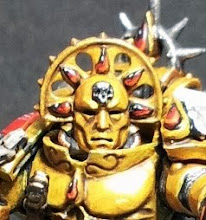Note: This post turned out a lot longer than I'd expected, and it may be a bit heavy for many of my readers, especially those whose minds have been hobbled by the Malaysian Ministry of Education. As such, to make it more palatable, I recommend imagining the following text being read out to you by the comforting voice of Morgan Freeman.
A fundamental difference between atheist and theist is this: Our respective attitudes towards the unknown. It's quite natural to view the unknown with a touch of suspicion or, more commonly, fear.
The human intellect is quite unique in this world in its capacity to reach far beyond it's immediate environment. And, being social animals with both memory and language, we establish cultures fitting to our environment, memeplexes to supplement our genes. If Blackmore's Meme Machine is anything to go by, it was about 2 million years ago that a mutant monkey first showed signs of an ability to copy. Thus, the 2nd replicator, the meme, was born, and since then the gene never quite caught up with the sheer pace of memetic evolution.
The reason for this massive difference is very simple. A gene's evolution is decided by the life and death of the organism. A meme's evolution is decided by the life and death of ideas. From the gene's point of view, trial and error may well cost the organism life and limb. From the memes point of view, trial and error costs nothing but a few moments' thought. Fear of the unknown is a relic left over from our genetic evolution. There is a brutish, base animal in all of us, and it knows fear. It is afraid to die, afraid of pain, afraid of ill-health and when we brought it with us in our genes into the social structures built by our memes, it found new things to fear.
Our genes make us just another breed of ape, physically well-suited for not much other than stomping around upright, grabbing stuff and, oddly enough, having sex in more positions than any other animal on Earth. Our memes, on the other hand, make us princes, paupers, lovers, fighters, dreamers, believers and nigh everything that we are today. But the genes have been slow to catch up, and there is a fearful, base animal in all of us.
In its weakest manifestation, it urges caution in everything we do. When it dominates us, it gives rise to irrational fear, phobias, and when mixed diabolically with the wrong memes, hatred. It gazes out into the unknown, is afraid and seeks comfort in any way it can. But you can't physically run away from what your mind has seen, can you? Like being stuck in a small room with a faceless Lovecraftian horror with no escape, what can you do? Oh, a few responses come to mind...
Denial - Don't look.
Self-delusion - Put a frilly pink dress on it.
Submission - Get on your knees and grovel and hope you get in its good books.
Sound familiar? How about we rephrase it a bit:
Denial - Make no attempt to understand it.
Self-delusion - Pretend its an all-loving father/mother figure.
Submission - Worship it and hope you get in its good books.
Thus gods were born. And it wasn't long before some people realized that if they convinced everybody else they had the favour of the gods, they could exert control over others, gaining power and influence. And so fear, born of genetic survival strategies, dropped into the pool of memes, has grown, twisted and corrupted out of proportion building a mighty memeplex about itself that we now know today as organised religion. It has taken the unknown and filled it with fanciful myths, providing the comfort the animal inside us so dearly desires, but not enlightenment.
In this light, it is fascinating to read the history of the Catholic Church, in more or less the same way that it's fascinating to watch footage of a nuclear bomb test. First, rising from the memetic primordial soup of myths and legends, it coalesced into just the right mix of the catchiest memes to form the backbone of Christianity. Then, spreading like a plague across Europe, firmly establishing its dominance by a mixture of its memetic strength and its ferocious rejection of skeptical inquiry. There it sat, mouldering and rotting from within, until in a sudden paroxysm of common sense, it broke under the weight of its own corruption and hypocrisy, giving birth to Protestantism, though in the long run, that just turned out to be a different flavour of the same myths. With that sudden, drastic loss of the Catholic Church's power, its strangehold on the intellectual life of Western Europe loosened, just enough for the right kind of people to unleash the right kind of ideas, sparking the Enlightenment. And the rest is history.
But to this day we haven't escaped that fearful animal in us, and he's manifest in our little irrationalities, passions, quirks and foibles. And of course, the continued existence of that memetic monument to fear of the unknown, organised religion.
Alrighty, this post is way longer than I'd anticipated. Tune in next time for the second part of this post, where I haul out a sample of theistic thinking from a forum and contrast it with some honest empiricism.
Subscribe to:
Post Comments (Atom)


No comments:
Post a Comment